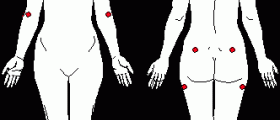
Urethral syndrome is a condition often confused and mistaken with interstitial cystitis or bladder syndrome. Another name for the urethral syndrome is frequency-dysuria syndrome. This disorder of the urinary tract is usually seen in women from 30 to 50 years of age. This condition is not a fatal one, but it makes a negative impact on the everyday activities of the person suffering from it.
Causes of urethral syndrome
Urethral syndrome is mainly caused by urethral stenosis, but there are also some other factors that may also be responsible for the incidence of this condition, such as the hormonal fluctuations, infections of the Skene glands and urinary tract infections. It is also considered that the inflammation of the paraurethral glands, traumatic sexual intercourse and environmental chemicals may also be potential culprits for the occurrence of the urethral syndrome.Contraceptive methods, sexual activity, long driving in vehicles, prolonged biking and prolonged horseback riding, as well as wearing tight underwear and using certain medicines, are the factors that may increase the chances for developing urethral syndrome.
Symptoms of urethral syndrome
The main symptoms of the urethral syndrome are related to the urinary problems, which are quite expectable, but there are also some other symptoms that may appear as well. The people who come to suffer from the urethral syndrome are urged to use the toilet every 30 to 60 minutes during a day, while urinating at night is not so frequent. Furthermore, the suprapubic discomfort is also present though not always, and it is not intense so that the person with this problem can have undisturbed sleep.
Dysuria is also a symptom of the urethral syndrome and it refers to the conditions marked by the persistent urethral irritation. Women may experience menstrual irregularity and dyspareunia, which occur as the result of the urethral syndrome, especially in cases of postmenopausal women.
Treatment for urethral syndrome
The aim of treatment of this condition is to alleviate the symptoms like discomfort and frequency of the urination. There are three treatment options used for this disorder, and they are medications, behavioral therapy and dietary therapy.The most commonly prescribed medications for the urinary syndrome are hormone replacement therapy, antispasmodics and anesthetics. Moreover, TCAs and muscle relaxants, as well as alpha-blockers, are also often given to the people with the urethral syndrome. Biofeedback, hypnosis and meditations are the three methods employed in the behavioral therapy, which has been proved to give the results when the urethral syndrome is in question. Dietary therapy involves the consumption of the foods that increase urinary pH.

















Your thoughts on this
Loading...